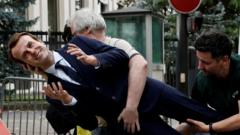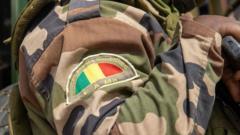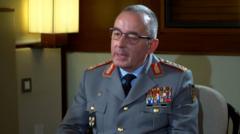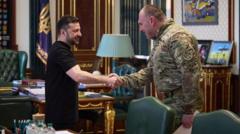Amid pervasive fear, three Ukrainians reveal their struggles and small acts of resistance while living under brutal Russian occupation, sharing their stories of oppression, survival, and hope.
Silent Resistance: Life Under Russian Occupation in Ukraine

Silent Resistance: Life Under Russian Occupation in Ukraine
In the shadows of occupied cities, Ukrainians persist in their quiet defiance against Russian control.
A fifth of Ukraine’s land is currently under Russian occupation, and the prospects for an amicable resolution to the ongoing conflict seem dim for those caught in the crossfire. Three individuals, Mavka, Pavlo, and Iryna, who reside in different Russian-controlled cities, describe the relentless pressure to conform, the constant fear of reprisal for dissent, and the small acts of rebellion they engage in daily.
Mavka has chosen to remain in Melitopol, her birthplace, since the invasion began on February 25, 2022. She expressed a deep-seated belief that it is "unfair that someone can just come to my home and take it out." In Melitopol, she has witnessed a pronounced effort towards what she terms "Russification." Posters promoting conscription hang throughout the city, and schools now normalize military culture, including students donning Russian military attire instead of typical school uniforms.
In Mariupol, another hard-hit city approximately 200 kilometers from Melitopol, Pavlo articulates the sensation of isolation and despair among its residents. After narrowly escaping death during the brutal siege that besieged the city for three months in 2022, he now finds himself trapped by familial obligations to care for elderly relatives. He reveals that Russian citizenship has become a prerequisite for basic needs like education, employment, and medical assistance. Furthermore, the price of property is a common topic of discussion as residents grapple with returning to demolished homes.
Similar sentiments of despair are echoed by Iryna, who continues to live in Crimea's oppressive environment since its annexation in 2014. She laments the systematic obliteration of Ukrainian identity, where speaking Ukrainian in public can result in severe repercussions. “They might not shoot you straight away, but you can simply disappear afterwards,” she warns. Although she clings to her cultural heritage by occasionally wearing traditional clothes during private video calls, the constant scrutiny and threat of violence haunt her.
In these occupied territories, small acts of resistance symbolize an enduring spirit. Mavka describes her involvement with a secret women’s resistance group called Zla Mavka. They engage in acts both symbolic and tactical, like discreetly placing Ukrainian symbols around town or distributing leaflets to foster solidarity among the Ukrainian populace. They even employ humor by slipping laxatives into food intended for Russian soldiers—a risk that could lead to severe punishment.
Despite the dire circumstances, each of them carries the weight of hope. Mavka remains in contact with developments in Kyiv, yearning for reassurance that her city will not be forgotten in the broader struggle. Others, like Pavlo advocate for a peaceful resolution, even under painful conditions, emphasizing that every life carries inestimable value.
As the war drags on, Iryna worries about the future of the young generation in occupied Crimea, describing children mimicking their fathers recently returned from war. “These kids are not taught to build peace; they are taught to fight,” she reflects with a heavy heart.
In these tumultuous times, stories of quiet resistance become beacons of strength, illustrating a relentless determination to preserve Ukrainian identity amid overwhelming oppression.



















